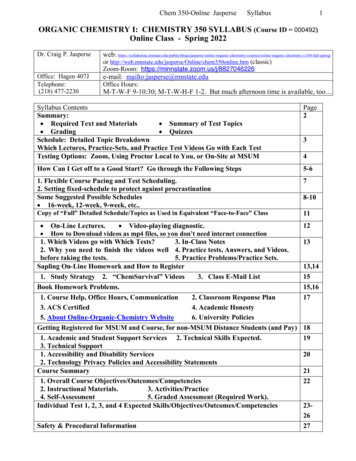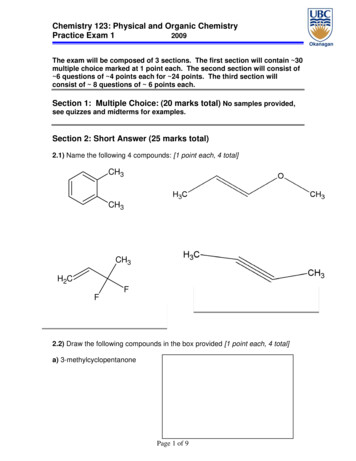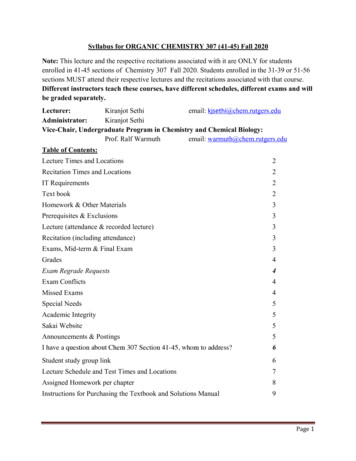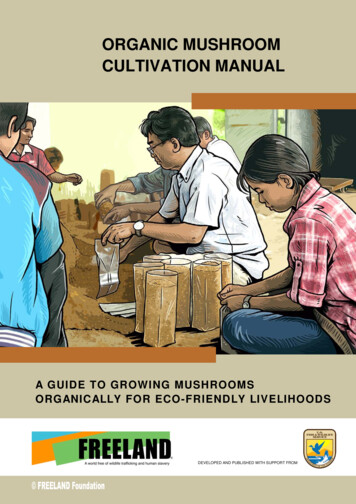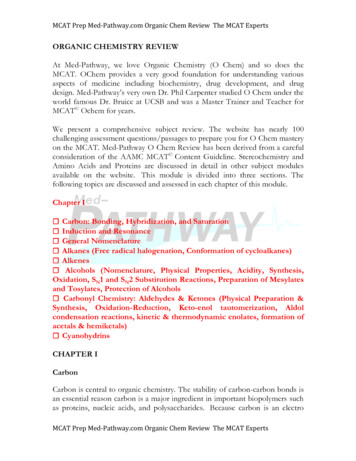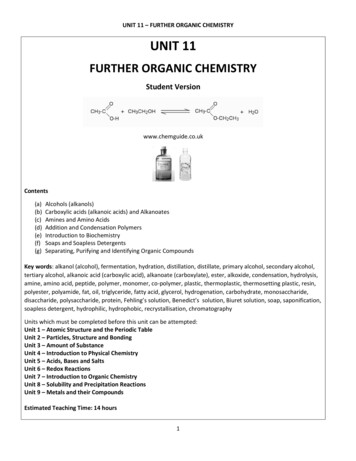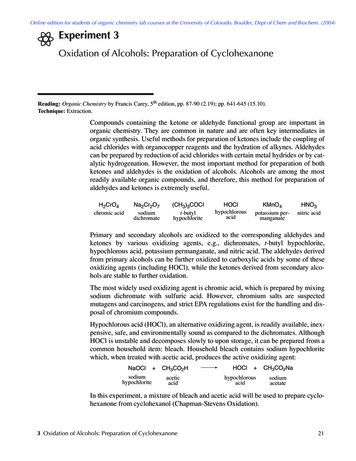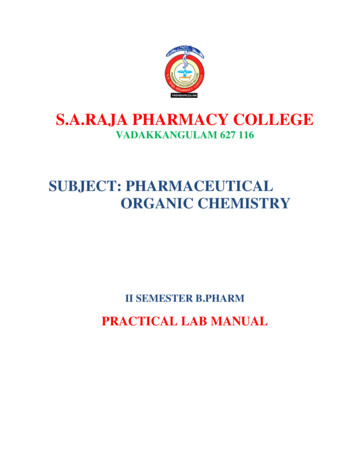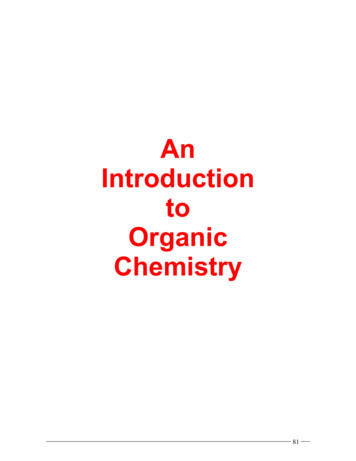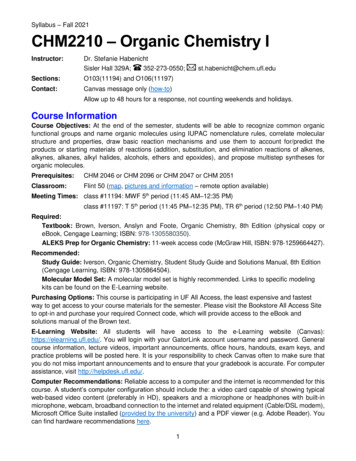
Transcription
Syllabus – Fall 2021CHM2210 – Organic Chemistry IInstructor:Dr. Stefanie HabenichtSisler Hall 329A;352-273-0550;Sections:O103(11194) and O106(11197)Contact:Canvas message only (how-to)st.habenicht@chem.ufl.eduAllow up to 48 hours for a response, not counting weekends and holidays.Course InformationCourse Objectives: At the end of the semester, students will be able to recognize common organicfunctional groups and name organic molecules using IUPAC nomenclature rules, correlate molecularstructure and properties, draw basic reaction mechanisms and use them to account for/predict theproducts or starting materials of reactions (addition, substitution, and elimination reactions of alkenes,alkynes, alkanes, alkyl halides, alcohols, ethers and epoxides), and propose multistep syntheses fororganic molecules.Prerequisites:CHM 2046 or CHM 2096 or CHM 2047 or CHM 2051Classroom:Flint 50 (map, pictures and information – remote option available)Meeting Times: class #11194: MWF 5th period (11:45 AM–12:35 PM)class #11197: T 5th period (11:45 PM–12:35 PM), TR 6th period (12:50 PM–1:40 PM)Required:Textbook: Brown, Iverson, Anslyn and Foote, Organic Chemistry, 8th Edition (physical copy oreBook, Cengage Learning; ISBN: 978-1305580350).ALEKS Prep for Organic Chemistry: 11-week access code (McGraw Hill, ISBN: 978-1259664427).Recommended:Study Guide: Iverson, Organic Chemistry, Student Study Guide and Solutions Manual, 8th Edition(Cengage Learning, ISBN: 978-1305864504).Molecular Model Set: A molecular model set is highly recommended. Links to specific modelingkits can be found on the E-Learning website.Purchasing Options: This course is participating in UF All Access, the least expensive and fastestway to get access to your course materials for the semester. Please visit the Bookstore All Access Siteto opt-in and purchase your required Connect code, which will provide access to the eBook andsolutions manual of the Brown text.E-Learning Website: All students will have access to the e-Learning website (Canvas):https://elearning.ufl.edu/. You will login with your GatorLink account username and password. Generalcourse information, lecture videos, important announcements, office hours, handouts, exam keys, andpractice problems will be posted here. It is your responsibility to check Canvas often to make sure thatyou do not miss important announcements and to ensure that your gradebook is accurate. For computerassistance, visit http://helpdesk.ufl.edu/.Computer Recommendations: Reliable access to a computer and the internet is recommended for thiscourse. A student’s computer configuration should include the: a video card capable of showing typicalweb-based video content (preferably in HD), speakers and a microphone or headphones with built-inmicrophone, webcam, broadband connection to the internet and related equipment (Cable/DSL modem),Microsoft Office Suite installed (provided by the university) and a PDF viewer (e.g. Adobe Reader). Youcan find hardware recommendations here.1
CHM2210 – Organic Chemistry ISyllabusFall 2021Office Hours:Mondays and Fridays 10:00 AM–11:00 AM, Thursdays 10:00 AM–11:30 AM.Undergraduate TAs’ (UGTA) Office Hours: schedule posted to Canvas.The office hour schedule is subject to change. Some office hours will be held in person (Sisler Hall 340,CCB 203), and some via Zoom. Individual links to Zoom office hours will be posted to Canvas.Recording Notice: Class meetings may be audio-visually recorded. Recordings will generally capturethe lecture board and view of the instructor podium. Students who step into this space consent to beingaudio-visually recorded; students who participate orally are agreeing to have their voices recorded.Assignments and GradingYour grade will be based on the following items:Syllabus QuizALEKS Prep Course:Four (4) Progress Exams:Cumulative Final Exam:TOTAL:1%3%70% (17.5% each)26%100%Your grade will be calculated based on the following grading scale:A:B : 87-89.99 B:C : 75-78.99 C:D : 55-59.99 D:92-10082-86.9965-74.9950-54.99A-: 90-91.99B-: 79-81.99C-: 60-64.99D-: 45-49.99 E: 45The instructors reserve the right to change the grading scale at any point during the semester.Grades will be assigned in accordance with University policy: rades-grading-policies/.Syllabus Quiz: An open-syllabus quiz will be given over the first two weeks of class via Canvas quizzes.The quiz will open on the first day of class (8/23/2021) and will be due on 9/5/2021 at 11:59 PM. You willbe allowed unlimited attempts and unlimited time on this quiz.ALEKS: You must complete 100% of the ALEKS Prep course by 9/10/2021 (11:59 PM) to receive fullcredit for this assignment (3% of the final grade). Students who complete less than 100% by 9/10/2021will receive zero (0) points; there will be no partial credit for the ALEKS assignment.Progress Exams: There will be four (4) 100-point progress exams given on campus in assembly (8:20PM–9:50 PM). Progress exams will be cumulative but will emphasize material covered following theprevious exam. Exam dates are listed in the course schedules at the end of this syllabus.Final Exam: A cumulative final exam will be given on Saturday, Dec. 11, 2021 (8:00 PM–10:00 PM).Exam Absence Policy: This course administers all conflicts with scheduled exams in accord with theUniversity policy /attendance-policies/). Universityrecognized conflicts include, but are not limited to, religious observances, participation in official universityactivities, military obligations, and court-imposed legal obligations. Students will be given the opportunityto take a conflict exam, which will be given shortly before the scheduled exam provided that the conflictis a) properly documented and b) disclosed to the Instructor at least one week before the scheduledexam.2
SyllabusCHM2210 – Organic Chemistry IFall 2021Unpredicted Absences due to medical or sudden family emergencies are not covered under the aboveconflict exam policy. A student who is absent for an exam due to one of the reasons listed above mustcontact the instructor as soon as they are able, and must submit documentation to the Dean of StudentsOffice /). Once the instructor is satisfied with the validity ofthe documentation, a make-up exam will be scheduled after a reasonable amount of time, i.e., before theend of the semester. If the student’s documentation is deemed insufficient to excuse the absence, a scoreof zero will be assigned for the missed exam. Exams missed without any documentation will be assigneda score of zero.Exam Regrades: If you have a question concerning the grading of an exam, you may submit it forregrading. Once submitted, the entire exam will be regraded to ensure accuracy, and your score mayincrease or decrease accordingly. All regrade requests must be submitted in writing to Dr. Habenicht bythe student no later than 5 school days after the date that the exams are returned to the class. Staple thecover sheet (regrade request form) provided on Canvas to the exam and briefly describe the perceivedgrading error. Questions regarding grades/grading are not accepted by email or Canvas message.Please note that your exams may be photocopied prior to being returned to you.Other Information and PoliciesPractice Problems: Practice problems will be assigned from the questions at the end of each chapter(EOC) and instructor worksheets/workbook. These homework assignments will not be collected orgraded. However, completion and understanding of the practice problems will be of critical importance tosucceeding in this course. Do not turn to the solutions manual immediately! Understanding a givensolution does not teach you any problem-solving skills. Keep up with the course and you will be in goodshape. Try and allow at least 2 hours per day (6 days a week) to study, work the problems and read thebook chapters.Questions? Just Ask! This term we will be using Piazza for class discussion. The system is highlycatered to getting you help fast and efficiently from classmates, TAs, and instructors. You can even askquestions anonymously! Do not send questions via email or Canvas message. If you have any problemsor feedback for the developers, email team@piazza.com.You can find a link to our Piazza class page on the e-Learning website.Contacting the Instructor/Office Hours: Canvas messages are for administrative purposes only, andnot for distance-instruction. All academic inquiries must be made during office hours or on Piazza (seebelow). Be prepared before attending office hours, bring specific questions and your previous work.Questions about grades will not be discussed during office hours due to privacy regulations.For private or grade-related questions, direct your questions directly to the instructor using the Canvasmessage function. Do not email outside of Canvas to your instructor’s email; you will be asked toresend the query through Canvas.Attendance and Classroom Etiquette: Although attendance will not be taken, students are expectedto come to class and be there on time. Please be respectful of others and adjust your cell phone so thatit does not ring during class. If you arrive late on exam days you will not be given additional time.Netiquette: All members of the class are expected to follow rules of common courtesy in all emailmessages, threaded discussions, and chats. When attending Zoom meetings, please come prepared.Mute your audio whenever you are not speaking. Be presentable: clothing is not optional. Make sure notto show any personally identifiable information and/or other items that you do not wish others to see. Letothers finish what they are saying and only speak when it is your turn. Be present: you can check youremail and work on other tasks after the meeting. Turn off all notifications and make sure your cell phonedoes not ring.3
SyllabusCHM2210 – Organic Chemistry IFall 2021Advising Issues: Visit or contact one of the chemistry undergraduate advisors.Website: ail: advising@chem.ufl.eduAccommodations for Students with Disabilities: Students with disabilities requestingaccommodations should first register with the Disability Resource Center (352-392-8565,https://disability.ufl.edu/) by providing appropriate documentation. Once registered, students will receivean accommodation letter which must be presented to the instructor when requesting accommodations.U Matter, We Care: Your well-being is important to the University of Florida. The U Matter, We Careinitiative (http://www.umatter.ufl.edu/) is committed to creating a culture of care on our campus byencouraging members of our community to look out for one another and to reach out for help if a memberof our community is in need. If you or a friend is in distress, please contact umatter@ufl.edu so that theU Matter, We Care Team can reach out to the student in distress. A nighttime and weekend crisiscounselor is available by phone at 352-392-1575. The U Matter, We Care Team can help connectstudents to the many other helping resources available including, but not limited to, Victim Advocates,Housing staff, and the Counseling and Wellness Center. Please remember that asking for help is a signof strength. In case of emergency, call 9-1-1.Faculty Evaluations: Students are expected to provide professional and respectful feedback on thequality of instruction in this course by completing course evaluations online via GatorEvals. Guidance onhow to give feedback in a professional and respectful manner is available athttps://gatorevals.aa.ufl.edu/students/. Students will be notified when the evaluation period opens, andcan complete evaluations through the email they receive from GatorEvals, in their Canvas course menuunder GatorEvals, or via https://ufl.bluera.com/ufl/. Summaries of course evaluation results are availableto students at lass Recording: Students are allowed to record video or audio of class lectures. However, thepurposes for which these recordings may be used are strictly controlled. The only allowable purposesare (1) for personal educational use, (2) in connection with a complaint to the university, or (3) as evidencein, or in preparation for, a criminal or civil proceeding. All other purposes are prohibited. Specifically,students may not publish recorded lectures without the written consent of the instructor.A “class lecture” is an educational presentation intended to inform or teach enrolled students about aparticular subject, including any instructor-led discussions that form part of the presentation, anddelivered by any instructor hired or appointed by the University, or by a guest instructor, as part of aUniversity of Florida course. A class lecture does not include lab sessions, student presentations, clinicalpresentations such as patient history, academic exercises involving solely student participation,assessments (quizzes, tests, exams), field trips, private conversations between students in the class orbetween a student and the faculty or lecturer during a class session.Publication without permission of the instructor is prohibited. To “publish” means to share, transmit,circulate, distribute, or provide access to a recording, regardless of format or medium, to another person(or persons), including but not limited to another student within the same class section. Additionally, arecording, or transcript of a recording, is considered published if it is posted on or uploaded to, in wholeor in part, any media platform, including but not limited to social media, book, magazine, newspaper,leaflet, or third party note/tutoring services. A student who publishes a recording without written consentmay be subject to a civil cause of action instituted by a person injured by the publication and/or disciplineunder UF Regulation 4.040 Student Honor Code and Student Conduct Code.4
SyllabusCHM2210 – Organic Chemistry IFall 2021Copyright Notice: All handouts used in this course are copyrighted and may not be copied without theinstructors’ expressly granted permission. ‘Handouts’ include all materials generated for this class, whichinclude but are not limited to syllabi, exams, problems, in-class materials, review sheets, problem sets,or other materials. Tutors and tutoring services are expressly forbidden from copying any or all of thesematerials without prior written permission. Only students currently enrolled in the class may make a singlecopy of this material for their personal use.The UF Student Honor CodeUF students are bound by The Honor Pledge which states:We, the members of the University of Florida community, pledge to hold ourselves and our peers to thehighest standards of honor and integrity by abiding by the Honor Code. On all work submitted for creditby students at the University of Florida, the following pledge is either required or implied: “On my honor,I have neither given nor received unauthorized aid in doing this assignment.”Honor Code violations include, but are not limited to, copying on an exam (or helping another student tocopy), submitting someone else’s work as your own, having another person complete assignments foryou, and unauthorized collaboration.Any student found responsible for an academic honesty violation will receive a zero (0) for thecompromised exam or assignment.The Conduct Code specifies a number of behaviors that are in violation of this code and the possiblesanctions. Click here to read both the Honor Code and the Conduct Code. If you have any questions orconcerns, please consult with the instructor.5
SyllabusCHM2210 – Organic Chemistry IFall 2021Tentative Course Schedule – Class #11194 (MWF)DateM, 8/23W, 8/25F, 8/27M, 8/30W, 9/1F, 9/3M, 9/6W, 9/8F, 9/10M, 9/13W, 9/15F, 9/17M, 9/20W, 9/22F, 9/24M, 9/27W, 9/29F, 10/1M, 10/4W, 10/6F, 10/8M, 10/11W, 10/13F, 10/15M, 10/18W, 10/20F, 10/22M, 10/25W, 10/27F, 10/29M, 11/1W, 11/3F, 11/5M, 11/8W, 11/10F, 11/12M, 11/15W, 11/17F, 11/19M, 11/22W, 11/24F, 11/26M, 11/29T, 11/30W, 12/1F, 12/3M, 12/6W, 12/8F, 12/10S, 12/11Chapter(s): TopicsIntroduction1: Line-Angle Formulas, Functional Groups1: ResonanceIntro to MO Theory1: Hybridization, Hybridization for Atoms with Lone Pairs4: Conjugate Acid-Base Pairs, Brønsted-Lowry Bases, Acid Strength, Acid-Base EquilibriaHoliday (no class)4: Mechanisms of Acid-Base Reactions, Factors Affecting Acid Strength, Lewis Acids and BasesExam #1 (Chapters 1 and 4) – no class2: Alkane Intro and Nomenclature, Structural Isomers2: Conformational Analysis of Alkanes2: Intro to Cycloalkanes, Cycloalkane Nomenclature2: Conformational Analysis of Cycloalkanes3: The Concept of Chirality, Chiral Atoms and Molecules, Types of Stereoisomers3: Naming Chiral Centers (Assigning R/S), CIP Rules, Acyclic Molecules with 2 Stereocenters3: Acyclic Molecules: meso Compounds, Fischer Projections3: Cyclic Molecules with 2 Stereocenters, Optical Activity, Enantiomeric Excess, ResolutionReviewExam #2 (Chapters 2 and 3) – no class5: Alkene Intro and Nomenclature, Alkene Reactions PrimerHomecoming (no class)6: Addition of Hydrogen Halides to Alkenes, Carbocation Stability6: Regioselectivity and Stereochemistry of Hydrohalogenation, Carbocation Rearrangements6: Acid-Catalyzed Hydration, Addition of X2 to Cyclic Alkenes6: Addition of X2 to Acyclic Alkenes, Halohydrin Formation (Addition of HOX to Alkenes)6: Oxymercuration-Reduction, Hydroboration-Oxidation6: Oxidation, Reduction and Stability of Alkenes7 Alkyne Intro and Nomenclature, Acidity and Alkylation of 1-Alkynes, Alkynes from Alkenes8 Electrophilic Addition to Alkynes, Hydration and Reduction of Alkynes, Organic SynthesisReview, Synthesis ExamplesExam #3 (Chapters 5–7) – no class8: Structure of Haloalkanes, Regioselectivity and Energetics of Free Radical Halogenation8: Radical Mechanism, Energetics of Chain Propagation Steps, Hammond’s Postulate8: Allylic Bromination, Radical Addition of HBr to Alkenes9: Overview of Substitution and Elimination9: SN2 Intro, Mechanism and Details(no class)9: SN1 Reaction, E1 Reaction, E2 Reaction9: Stereochemistry of E2 Reaction, Examples (SN2/E1/SN2/E2)10: Alcohol Intro and Nomenclature, Alkoxide Formation, Conversion to Alkyl Halides10: Formation of Alkyl/Aryl Sulfonates, Acid-Cat. Dehydration, Pinacol Rearrangement, OxidationHoliday (no class)Holiday (no class)Review, Synthesis ExamplesExam #4 (Chapters 8–10) – no class(no class)11: Ether Structure and Nomenclature, Preparation and Reactions11: Preparation and Reactions of Epoxides(no class)Reading Day (no class)Cumulative Final Exam (Chapters 1–11)6
CHM2210 – Organic Chemistry ISyllabusFall 2021Tentative Course Schedule – Class #11197 (TTR)DateM, 8/24R, 8/28T, 8/31R, 9/2T, 9/7*R, 9/9F, 9/10T, 9/14R, 9/16T, 9/21R, 9/23T, 9/28R, 9/30M, 10/4T, 10/5*R, 10/7T, 10/12R, 10/14T, 10/19R, 10/21T, 10/26R, 10/28M, 11/1T, 11/2R, 11/4T, 11/9R, 11/11T, 11/16R, 11/18T, 11/23R, 11/25T, 11/30R, 12/2T, 12/7*R, 12/9S, 12/11Chapter(s): TopicsIntroduction1: Line-Angle Formulas, Functional Groups1: ResonanceIntro to MO Theory1: Hybridization, Hybridization for Atoms with Lone Pairs4: Conjugate Acid-Base Pairs, Brønsted-Lowry Bases, Acid Strength, Acid-Base Equilibria4: Mechanisms of Acid-Base Reactions, Factors Affecting Acid Strength, Lewis Acids and Bases(co class)Exam #1 (Chapters 1 and 4) – no class2: Alkane Intro and Nomenclature, Structural Isomers2: Conformational Analysis of Alkanes2: Intro to Cycloalkanes, Cycloalkane Nomenclature2: Conformational Analysis of Cycloalkanes3: The Concept of Chirality, Chiral Atoms and Molecules, Types of Stereoisomers3: Naming Chiral Centers (Assigning R/S), CIP Rules, Acyclic Molecules with 2 Stereocenters3: Acyclic Molecules: meso Compounds, Fischer Projections3: Cyclic Molecules with 2 Stereocenters, Optical Activity, Enantiomeric Excess, ResolutionReviewExam #2 (Chapters 2 and 3) – no class5: Alkene Intro and Nomenclature, Alkene Reactions Primer(no class)6: Addition of Hydrogen Halides to Alkenes, Carbocation Stability6: Regioselectivity and Stereochemistry of Hydrohalogenation, Carbocation Rearrangements6: Acid-Catalyzed Hydration, Addition of X2 to Cyclic Alkenes6: Addition of X2 to Acyclic Alkenes, Halohydrin Formation (Addition of HOX to Alkenes)6: Oxymercuration-Reduction, Hydroboration-Oxidation6: Oxidation, Reduction and Stability of Alkenes7 Alkyne Intro and Nomenclature, Acidity and Alkylation of 1-Alkynes, Alkynes from Alkenes8 Electrophilic Addition to Alkynes, Hydration and Reduction of Alkynes, Organic SynthesisReview, Synthesis ExamplesExam #3 (Chapters 5–7) – no class8: Structure of Haloalkanes, Regioselectivity and Energetics of Free Radical Halogenation8: Radical Mechanism, Energetics of Chain Propagation Steps, Hammond’s Postulate(no class)8: Allylic Bromination, Radical Addition of HBr to Alkenes9: Overview of Substitution and Elimination SN2 Intro, Mechanism and DetailsHoliday (no class)9: SN1 Reaction, E1 Reaction, E2 Reaction9: Stereochemistry of E2 Reaction, Examples (SN2/E1/SN2/E2)10: Alcohol Intro and Nomenclature, Alkoxide Formation, Conversion to Alkyl Halides10: Formation of Alkyl/Aryl Sulfonates, Acid-Cat. Dehydration, Pinacol Rearrangement, OxidationReview, Synthesis ExamplesHoliday (no class)Exam #4 (Chapters 8–10) – no class11: Ether Structure and Nomenclature, Preparation and Reactions11: Preparation and Reactions of EpoxidesReading Day (no class)Cumulative Final Exam (Chapters 1–11)*5th period only. Stefanie H. Habenicht7
Textbook: Brown, Iverson, Anslyn and Foote, Organic Chemistry, 8th Edition (physical copy or eBook, Cengage Learning; ISBN: 978-1305580350). ALEKS Prep for Organic Chemistry: 11-week access code (McGraw Hill, ISBN: 978-1259664427). Recommended: Study Guide: Iverson, Organic Chemistry
